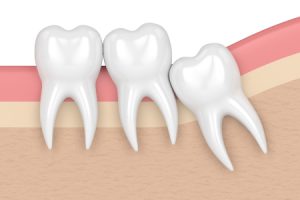
Why Get Rid of Wisdom Teeth?
Wisdom teeth are the third set of molars at the very back of the mouth. They appear in late adolescence, at about ages 17 to 25, depending on the individual. The problem is that most people simply don’t have enough room to accommodate these extra teeth.
When wisdom teeth are “impacted,” it means they are causing problems for neighboring teeth, possibly disrupting their alignment. They are also notorious for emerging in irregular positions, partially emerging, or failing to emerge at all. All this results in problems that may include pain, swelling, irritation & sensitivity, as well as bad breath and infection.
Additionally, for those who do have room to accommodate these extra teeth, keeping them into adulthood can cause other difficulties. Being situated so far back in the mouth makes them hard to brush and floss properly. In the long run, wisdom teeth experience higher rates of cavities and tooth decay and often end up requiring extraction.
Then Why Do We Have Them?
In prehistoric times, skeletal records have shown that our jaws were bigger. Humans required a powerful jaw and sturdy teeth to withstand chewing raw plants and uncooked meat. However, the human jaw has atrophied due to the advent of cooking and a modern diet consisting of softer foods. Still, throughout most history, until relatively recently, it was common to lose teeth. Therefore it was helpful to have an extra molar in each quadrant. Nowadays, thankfully, people are keeping their full set of teeth until much later in life. That’s good news for their oral health, but unfortunately, it means they often need wisdom teeth extraction.
Does My Child Need Their Wisdom Teeth Removed?
Wisdom tooth removal has become a common rite of passage, but it’s not always necessary. For children and adolescents at our practice, we will monitor their development with routine X-rays, performed at regular intervals. Then we can determine if and when the wisdom teeth need to go!
